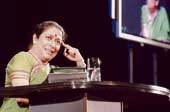 |
| Arundhati Nag in Bikhre Bimb at Academy. Picture by Aranya Sen |
The second leg of Nandikar’s National Theatre Festival turned out to be a Hindi festival, yet ironically the best production in the national language (and indeed the entire fest) came from Bangalore.
Girish Karnad’s latest, Broken Images, translated as Bikhre Bimb and co-directed by K.M. Chaitanya for Ranga Shankara, was worth the wait. Revisiting his favourite device of an erotic triangle, it switches his usual co-ordinates to one man with two women. A Kannada author is found guilty of identity theft, for printing her sister’s manuscript of an English novel in her name.
Complicated by linguistic (regional vs English), sexual (her husband falls for her sister) and even electronic (the omnipresent screen) politics, this 21st-century play makes tough demands on technology, as the monitor in a TV studio shows her image interrogating her live on stage.
A nerve-wracking ask for any performer, it becomes a sheer tour de force for Arundhati Nag, who also created the Kannada original last year. Her acting is not just unbelievably natural but timed perfectly, ending on cue whenever her virtual/virtuous self speaks on screen.
Another solo actress, Rashi Bunny, bilingually delivered three of the five monologues in Manjula Padmanabhan’s Hidden Fires, on communal violence, for Asmita (Delhi). Calcuttans can proudly say that the Red Curtain premiere in 2003 was far superior and much more intense, not merely because it presented all five monologues.
Director Arvind Gaur overstretches Bunny when different people should have enacted them, mutes the title piece (meant for a man) by changing it into a woman talking about her husband, and kills “Invocation” by omitting the horrifying mantra of 1,000 surnames.
Bunny succeeds only in Know the Truth, about the vacuous anchor in a feel-good chat show in English.
CEVA (Chandigarh) injected some invigorating spontaneity with Zindagi Retire Nahi Hoti. Munna Dhiman’s seemingly improvised scenario promotes dignity of life for senior citizens, but staged in a light and freewheeling style including several funny skits on domestic relationships. Gradually, however, directors G.S. Chani and Harleen Kohli digress into other things, as Dhiman himself confesses in the script.
Chani also performed an appropriately open-air Khuli Hawa ki Talash Mein, on environmental degradation.
Once again, the National School of Drama Repertory brought down a white elephant in the form of its Hindi version of Bhavabhuti’s Sanskrit classic Uttar-Ram-Charit. Why the once-radical activist Prasanna chose to direct it as a simple musical beats me. Worse, he curiously disabled the subtle rasas (in a drama considered second only to Shakuntala) by chopping huge chunks of Acts 2, 5 and 6. So we get just a pretty paraphrase and some manful singing by the Company members. If Prasanna had any political agenda, we missed it.
The NSD chair Devendra Raj Ankur’s Sankraman for his own group Sambhav (Delhi) failed to convert us to his methods of dramatising fiction.
Scripted from Kamta Nath’s short story, it narrates the conflicting attitudes of father, son and mother to their mutual relationships.
But Ankur’s three monologues should be intertwined rather than separate, because the father’s opening complaints bore so much by their ordinariness that we lose interest in the rest, despite assured acting by the son later.










